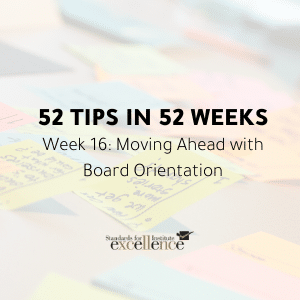

This is part of a special series, brought to you by the Standards for Excellence Institute, to provide nonprofit leaders with a brief nonprofit governance and management tip weekly over the course of 2020. We hope these short tips will be helpful to you and the nonprofits you serve. If you have suggestions for future topics, please forward these to acmadsen@standardsforexcellence.org.
Back in the mid-1990s, I had the privilege of working with the volunteer taskforce that ultimately developed and released the Standards for Excellence: An Ethics and Accountability Code for the Nonprofit Sector in 1998. The group had all the hallmarks of an exemplary volunteer team—incredibly dedicated, extremely knowledgeable, and willing to roll up their sleeves to get the job done! I learned so much from this group and I’m grateful for their service. Quite a few of these volunteers still support the Standards for Excellence program in various roles.
One of the projects this taskforce completed was a large-scale review of all of the existing codes of ethics that we could find from a variety of professional industries, the government, the private sector, and the nonprofit sector. Volunteers completed a substantial amount of homework to collect these codes. In these pre-internet years, finding such documents took a lot more work than it does today! The volunteers read each one, studied the topics addressed, and completed a matrix to assess the strengths and weaknesses of the various codes It was a terrific undertaking that resulted in one of the most comprehensive code of ethics for nonprofits that exists today.


Images from L-R: The cover of the very first Standards for Excellence code (circa 1998) and the first national edition of the Standards for Excellence code (circa 2001)
Having a code of ethics for the entire nonprofit sector is helpful to outline how nonprofit organizations can and should govern and manage their work. It is also important for individual nonprofits to have their own code of ethics to guide its work and decision-making. The Standards for Excellence states that nonprofits should “ensure that they have an explicit and clear set of ethical principles and, as appropriate, operational or program standards that have been discussed by their board and staff and that are transparently clear to all stakeholders.”
More information is available in the Standards for Excellence educational packet on developing a code of ethics which includes discussions of the reasons for having a code of ethics, how nonprofits can put their values into practice, types of codes of ethics, training on the ethics code, and steps to developing a code of ethics.
This educational resource packet and the full series of all packets – including sample policies, tools and model procedures to help nonprofits achieve best practices in their governance and management – can be accessed by contacting a licensed Standards for Excellence replication partner, one of the over 150 Standards for Excellence Licensed Consultants, or by becoming a member of the Standards for Excellence Institute.



